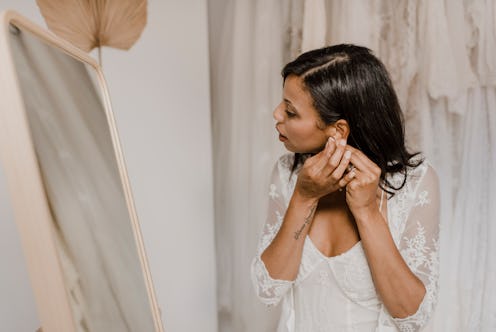Life
5 Surprisingly Feminist Weddings Traditions

As the number of couples getting hitched continues to dwindle, marriage can sometimes seem like an archaic institution — especially considering how many traditions are rooted in old-fashioned gender norms. However, feminist wedding traditions do exist, and they might be more common than you'd think.
Part of this is due to how marriage has evolved over the centuries. Historically, it was more of an exchange of property — the property being the bride, in case you needed a reminder to be thankful you were born in this century — than the partnership between equals marriage has become today. (Well, theoretically equal; modern women still end up with the vast majority of housework and childcare, often on top of their careers.) Unfortunately, many wedding customs we still practice today are holdovers from an era when women were considered something to be bought and sold. The most obvious example is the ubiquitous white wedding dress: Though the trend was largely started by Queen Victoria, over time, it grew heavy with religious connotations, with the white gown coming to symbolize the bride's virginity and equate her worth with her sexual purity. Yikes.
Of course, that's just the tip of the iceberg. By nature, weddings tend to be highly traditional, and problematic customs like the father "giving away" the bride or women taking their husbands' last names are still fairly common. However, this doesn't mean there's anything wrong with taking part in these traditions, nor does it mean that weddings (or marriage) can't be feminist. In the end, it's up to you to define what makes a wedding feminist; if that means wearing a poofy dress and tossing your garter at the groomsmen, go for it. If it means walking yourself down the aisle and keeping your last name, that's cool, too.
In fact, there are a number of ways wedding traditions can be surprisingly feminist — let's take a look at five below.
1. Writing Your Own Vows
Although many couples stick to traditional vows, some choose to write their own as a way to make their ceremony unique. It's an opportunity to let everyone know how much your partner means to you — and anything that gives women a voice is absolutely feminist.
2. Bachelorette Parties
Let's get this out of the way: Historically, bachelor parties were super sexist for a number of reasons, not least because they specifically exclude women. Furthermore, they're based on the notion that men are "giving up" something by getting married, which is why they deserve one last night of debauchery before tying the knot. It's not exactly feminist.
However, the rise of bachelorette parties in the 1960s finally gave women the chance to celebrate their sexuality with their own pre-wedding festivities, complete with penis straws and male strip clubs. Of course, they're not every couple's cup of tea (and the subsequent shenanigans can derail weddings entirely), but it is one of the few wedding traditions in which men and women are on relatively equal footing.
3. The Wedding Party
Wedding parties are customarily divided by gender: The bride chooses women, and the groom chooses men. However, recent decades have seen a shift in our choices for wedding parties; these days, it's not uncommon to see women in the groom's party or male bridesmaids. Ultimately, tradition appears to be shifting to allow you to choose people you're close to, no matter how they identify. (Besides, such gendered traditions are absurd in the face of increasingly flexible gender identities.)
4. Walking Down The Aisle
As we already discussed, the practice of "giving away" the bride is hella sexist. On the other hand, many brides these days use it as a chance to honor the people who raised them — they make their way to the altar accompanied by their mothers, families of choice, best friends, or totally solo. If that's not feminist, I don't know what is.
5. Same-Sex Marriage
Whether you're a lady marrying a lady, a dude marrying a dude, or any variation thereof, same-sex weddings are pretty feminist by their very nature. Gender equality is about equality for everyone, including the LGBTQ community, and same-sex ceremonies flip the traditionally heteronormative wedding script on its head.
Images: Westend61/Westend61/Getty Images, Giphy (5)